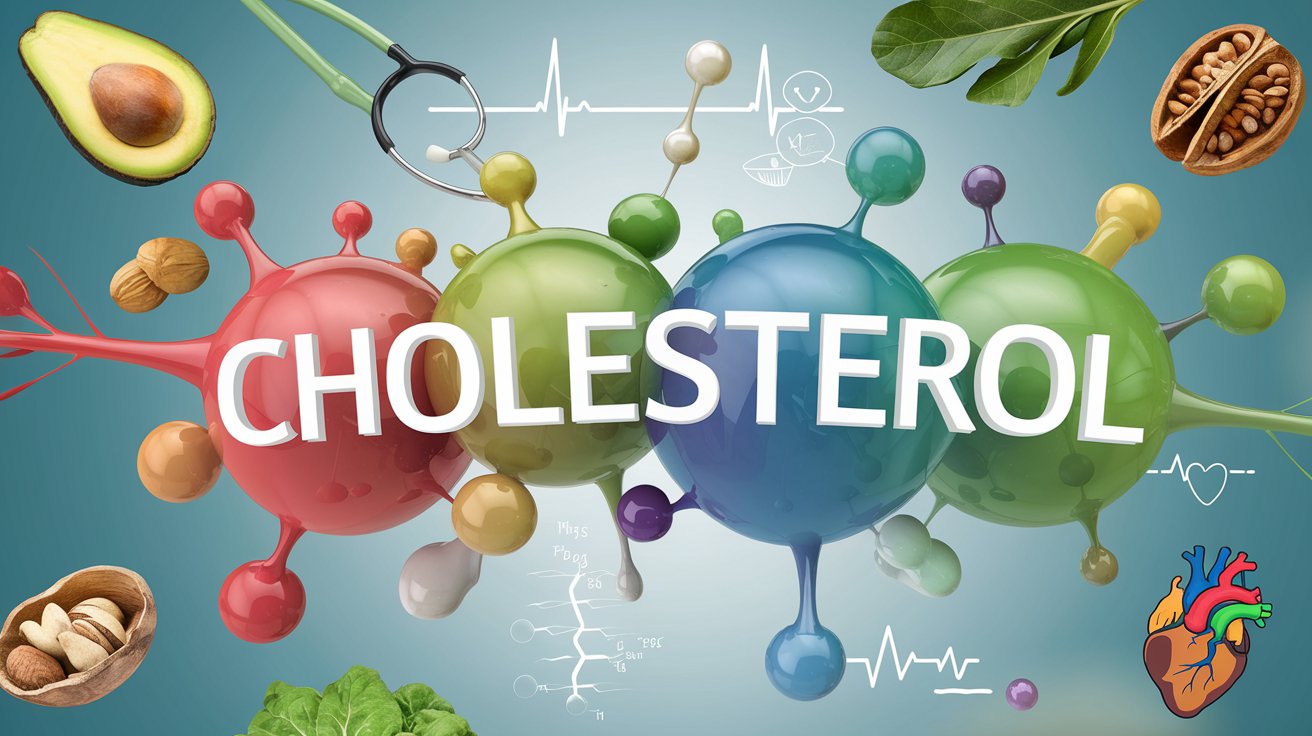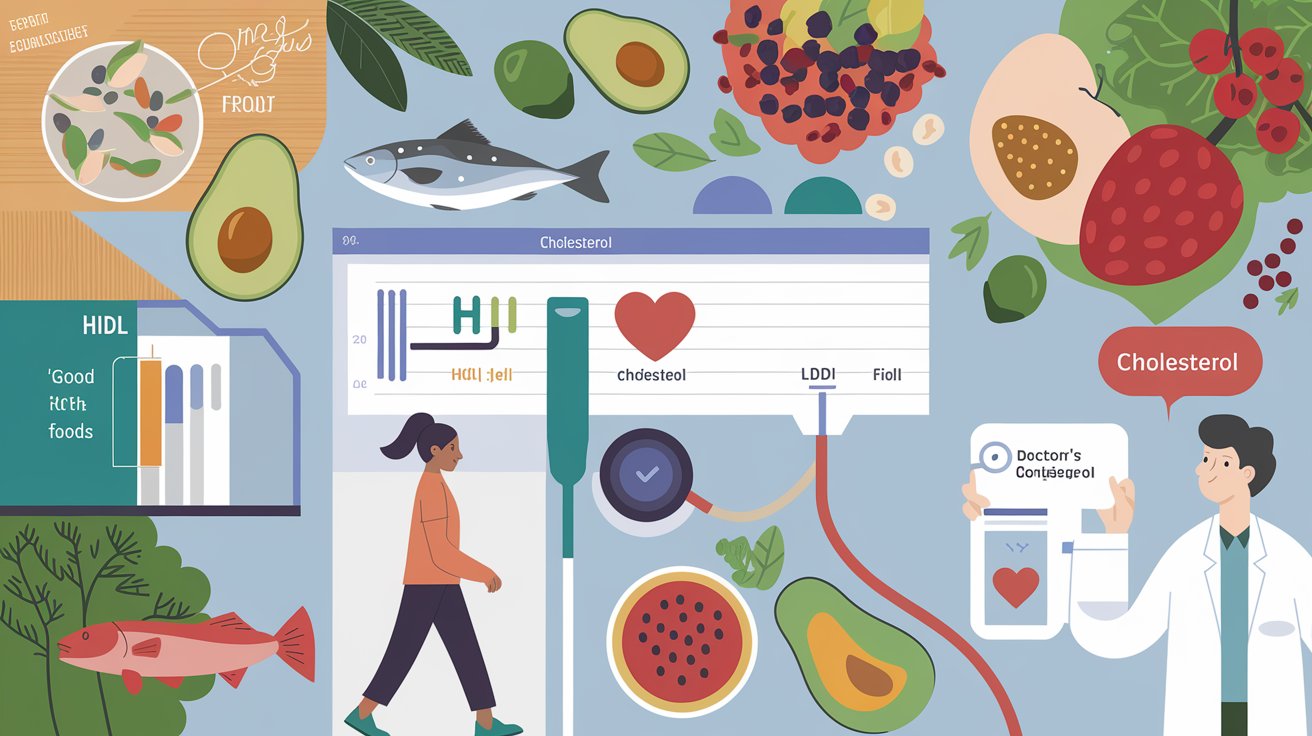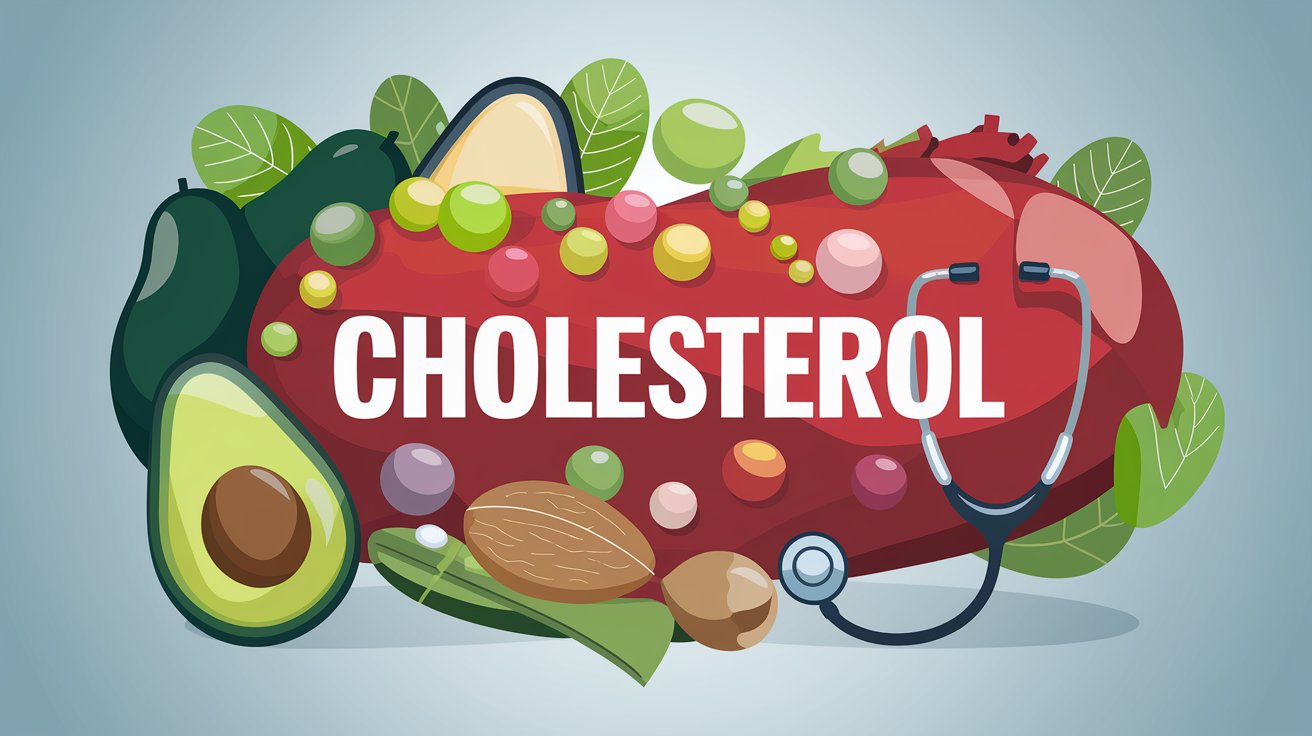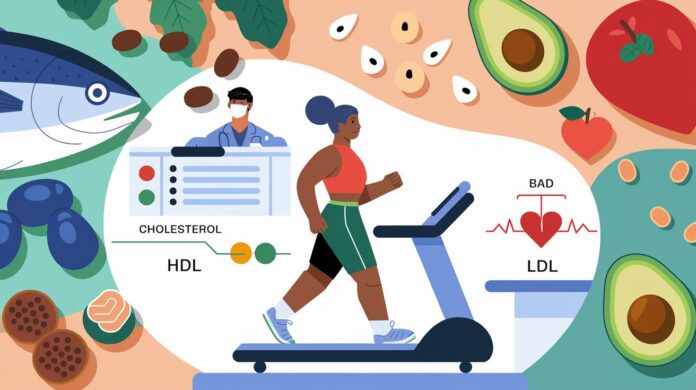Cholesterol is a complex topic that many people don’t fully understand. It’s important to know the difference between “good” and “bad” cholesterol. This guide will cover the basics of cholesterol, its effects on the body, and natural ways to manage it without medication.
By the end of this article, you’ll know more about cholesterol and how to keep it in balance. This will help you live a healthier and more vibrant life. Let’s explore how to manage cholesterol naturally.

Key Takeaways
- Cholesterol is a critical component for overall health, but understanding the differences between HDL and LDL is essential.
- High cholesterol levels can have adverse effects on the body, leading to an increased risk of heart disease and other health issues.
- Adopting a healthy diet, regular exercise, and making lifestyle changes can significantly improve cholesterol management without the need for medication.
- Certain nutrients, such as omega-3 fatty acids and fiber, play a vital role in supporting healthy cholesterol levels.
- Monitoring your cholesterol levels through regular testing is crucial for maintaining optimal heart health.
Understanding Cholesterol: The Good, The Bad, and The Essential
Cholesterol is a key substance in our blood. It’s not all the same, though. There’s HDL, or “good” cholesterol, and LDL, or “bad” cholesterol.
The Role of HDL vs LDL Cholesterol
HDL cholesterol is called “good” because it helps clear out LDL cholesterol from your blood. It carries it to your liver for removal. But, LDL cholesterol can clog your arteries, raising heart disease risk.
How Cholesterol Affects Your Body
It’s important to keep a balance between HDL and LDL cholesterol. Too much LDL cholesterol can lead to atherosclerosis. This is when plaque builds up in your arteries, blocking blood flow and increasing heart attack and stroke risk.
Normal Cholesterol Level Ranges
Here are the recommended cholesterol levels for adults:
- Total Cholesterol: Less than 200 mg/dL
- HDL Cholesterol: 40 mg/dL or higher for men, 50 mg/dL or higher for women
- LDL Cholesterol: Less than 100 mg/dL
- Triglycerides: Less than 150 mg/dL
Knowing about the different types of cholesterol helps you keep your levels healthy. This protects your heart and blood vessels.

Common Causes of High Cholesterol Levels
Keeping our cholesterol levels healthy is key to our well-being. But sometimes, our cholesterol can get too high. Knowing what causes high cholesterol is the first step to managing it.
An unhealthy diet is a big reason for high cholesterol. Foods like fried foods, processed meats, and baked goods raise LDL (bad) cholesterol. Not eating enough fiber from fruits, veggies, and whole grains also hurts our cholesterol management.
Genetics also affect what causes high cholesterol. Some people are born with a condition called familial hypercholesterolemia. This makes it harder to keep cholesterol levels in check with diet and lifestyle.
Certain medical conditions can also raise cholesterol. These include hypothyroidism, diabetes, and liver or kidney disease. They mess with our body’s cholesterol balance. High cholesterol symptoms might include fatigue, chest pain, and vision changes. But often, there are no clear signs.
Our lifestyle factors also play a part. Being inactive, drinking too much alcohol, and smoking can harm our cholesterol. These habits increase LDL and lower HDL, risking heart health.
Knowing the causes of high cholesterol helps us take action. We can manage levels with diet, exercise, and sometimes, medical help. Regular health checks and monitoring are crucial for keeping cholesterol healthy and avoiding high cholesterol side effects.

Natural Ways to Lower LDL Cholesterol Through Diet
The foods you eat are key to managing cholesterol levels. Adding foods that lower cholesterol and avoiding high-cholesterol ones can help your heart health.
Heart-Healthy Foods to Include Daily
- Oily fish rich in omega-3 fatty acids, such as salmon, mackerel, and sardines
- Nuts and seeds, including almonds, walnuts, and flaxseeds
- Whole grains, like oats, quinoa, and brown rice
- Legumes, such as lentils, chickpeas, and navy beans
- Avocados, which are high in monounsaturated fats
- Leafy green vegetables, packed with fiber and antioxidants
Foods to Avoid for Better Cholesterol Management
- Fried and processed foods, which are often high in unhealthy fats
- Red meat, which can contain high amounts of saturated fat
- Full-fat dairy products, such as cheese, butter, and whole milk
- Baked goods and pastries made with trans fats or hydrogenated oils
- Sugary snacks and beverages, which can contribute to high cholesterol
The Impact of Portion Control
What you eat and how much you eat matters for your cholesterol. Paying attention to portion sizes and eating a balanced diet helps manage cholesterol.
| Food Item | Recommended Portion Size | Cholesterol Impact |
|---|---|---|
| Salmon | 3-4 ounces | Lowers LDL cholesterol |
| Oats | 1/2 cup cooked | Reduces total and LDL cholesterol |
| Almonds | 1/4 cup | Lowers LDL and increases HDL cholesterol |
| Broccoli | 1 cup cooked | Helps lower total and LDL cholesterol |
By adding these cholesterol-lowering foods to your diet and watching your portions, you can naturally manage your LDL cholesterol levels.
The Power of Walking for Cholesterol Management
Looking for a simple way to manage your cholesterol? Walking is a great choice. It can lower your LDL (bad) cholesterol and raise your HDL (good) cholesterol.
Walking is easy and can fit into your daily life. Try a brisk walk during lunch or a slow stroll after dinner. Walking daily can burn fat and lower cholesterol over time.
Establishing an Effective Walking Routine
To get the most from walking, follow these tips:
- Duration: Walk for 30-60 minutes each day, a few times a week.
- Intensity: Walk at a pace that raises your heart rate but lets you talk.
- Consistency: Make walking a regular habit, not just an occasional activity.
The Advantages of Walking Over Other Exercises
Walking has special benefits for cholesterol management:
| Exercise | Cholesterol Benefits | Accessibility | Injury Risk |
|---|---|---|---|
| Walking | Lowers LDL, increases HDL | Requires no special equipment, can be done anywhere | Very low, low-impact |
| Running | Lowers LDL, may slightly increase HDL | Requires proper shoes and gear, limited to certain locations | Moderate to high, higher-impact |
| Swimming | May slightly lower LDL, no significant impact on HDL | Requires access to a pool or body of water | Low, low-impact |
Walking is a simple, accessible, and low-impact way to improve your cholesterol and heart health.
“Walking is the best possible exercise. Habituate yourself to walk very far.”
– Thomas Jefferson
Adding walking to your daily routine is a powerful way to lower cholesterol by walking, burn fat daily, and enjoy walking’s cholesterol benefits.
Essential Nutrients That Support Healthy Cholesterol Levels
Keeping your cholesterol levels healthy is key for your heart. Diet and exercise are important, but certain nutrients help too. Let’s look at some of these nutrients and their benefits.
Omega-3 Fatty Acids and Their Benefits
Omega-3 fatty acids, found in fatty fish, are good for your cholesterol. They can increase your HDL (good) cholesterol and lower your LDL (bad) cholesterol. They also fight inflammation, which is good for your heart.
The Role of Fiber in Cholesterol Control
Fiber, especially soluble fiber, is great for cholesterol. It binds to cholesterol in your gut, stopping it from getting into your blood. Eating more fiber-rich foods like oats, beans, and berries can help.
Important Vitamins and Minerals
Some vitamins and minerals are key for healthy cholesterol. Vitamin C and E protect LDL cholesterol from damage. Niacin (vitamin B3) also boosts HDL cholesterol and lowers triglycerides.
| Nutrient | Benefits for Cholesterol |
|---|---|
| Omega-3 Fatty Acids | Increase HDL, decrease LDL and triglycerides |
| Soluble Fiber | Bind to cholesterol, reduce absorption |
| Vitamin C and E | Antioxidant protection for LDL cholesterol |
| Niacin (Vitamin B3) | Increase HDL, decrease triglycerides |
Adding these nutrients to your diet can help keep your cholesterol healthy. It’s a natural way to support your heart health.
Lifestyle Changes That Make a Difference
Managing cholesterol levels is more than just diet and exercise. Making big lifestyle changes can really help your health and cholesterol. This section covers key lifestyle factors that help you how to manage cholesterol levels through diet and simple exercises to reduce cholesterol naturally.
Stress can harm your cholesterol levels. Using relaxation methods like meditation, deep breathing, or yoga can help. Also, getting enough sleep is key, as bad sleep can mess with your cholesterol.
Quitting smoking and drinking less alcohol are also big steps. Smoking lowers good cholesterol, while too much alcohol raises bad cholesterol. These changes work well with your diet and exercise to manage cholesterol.
For lasting results, manage cholesterol holistically. Add these lifestyle changes to a healthy diet and regular exercise, like lose weight by walking: practical tips. This will help you reach the best cholesterol levels and health.
“Small changes, consistently applied, can lead to big results when it comes to cholesterol management.”
| Lifestyle Factor | Impact on Cholesterol | Recommended Action |
|---|---|---|
| Stress Management | Reduces stress hormones that can elevate cholesterol | Practice relaxation techniques like meditation, deep breathing, or yoga |
| Sleep Hygiene | Adequate sleep is crucial for cholesterol regulation | Aim for 7-9 hours of quality sleep per night |
| Smoking Cessation | Improves HDL (good) cholesterol levels | Seek support and resources to quit smoking for good |
| Moderate Alcohol Consumption | Helps maintain healthy LDL (bad) cholesterol levels | Limit alcohol intake to no more than one drink per day for women and two for men |
By adopting these lifestyle changes, you can manage your cholesterol levels better. This will improve your health and well-being in many ways.
Understanding the Connection Between Weight and Cholesterol
Keeping a healthy weight is key to managing your cholesterol. Studies link body mass index (BMI) to cholesterol levels. People who are overweight or obese often have higher bad cholesterol and lower good cholesterol.
Body Mass Index and Cholesterol Correlation
Your BMI shows how much body fat you have. As BMI goes up, so does the risk of high cholesterol and heart disease. But, a healthy BMI means better good cholesterol levels.
Strategic Weight Loss Approaches
For those who are overweight or obese, losing weight is crucial. A fast walking to burn belly fat routine, along with a diet and walking for a healthy heart, works well. Also, tips to optimize walking and lose weight can help you reach your goals and keep your cholesterol healthy.
Knowing how weight and cholesterol are linked helps you take action. You can improve your health and lower heart disease risk.
Monitoring and Testing Your Cholesterol
It’s important to keep an eye on your cholesterol levels for a healthy heart. Regular tests help you track your progress and make smart choices about your diet and lifestyle. Knowing how to read your cholesterol test results is key to managing your levels.
Understanding Cholesterol Tests
The lipid panel is the most common test. It checks your total cholesterol, LDL (bad), HDL (good), and triglycerides. This test gives a full view of your cholesterol health. There are also more detailed tests, like the advanced lipoprotein test, that look at each part of your cholesterol.
Recommended Testing Frequency
The American Heart Association suggests testing every 4 to 6 years for adults over 20. But, if you have high cholesterol or heart disease, your doctor might want you to test more often, like every 1 to 2 years.
Tracking Your Progress
Watching your cholesterol levels over time helps you see if your efforts are working. By looking at your results, you can spot trends. This lets you adjust your diet, exercise, or other habits to keep your ldl vs hdl cholesterol in balance and your cholesterol levels healthy.
| Cholesterol Test | Optimal Range | Borderline Range | High Range |
|---|---|---|---|
| Total Cholesterol | Less than 200 mg/dL | 200-239 mg/dL | 240 mg/dL and above |
| LDL Cholesterol | Less than 100 mg/dL | 100-129 mg/dL | 130 mg/dL and above |
| HDL Cholesterol | 60 mg/dL and above | 40-59 mg/dL | Less than 40 mg/dL |
| Triglycerides | Less than 150 mg/dL | 150-199 mg/dL | 200 mg/dL and above |
Your healthcare provider can help you understand your test results. They can also guide you on how to keep your heart healthy.
When to Seek Medical Help for High Cholesterol
Managing high cholesterol is key, but sometimes you need medical help. Knowing the signs and risks can guide you to see a doctor when needed.
Warning Signs and Symptoms
High cholesterol often has no clear symptoms. So, regular check-ups are vital. Some signs to watch for include:
- Chest pain or discomfort
- Shortness of breath
- Numbness or tingling in the extremities
- Sudden changes in vision
- Unexpected weight loss or gain
High cholesterol also raises the risk of cancer and other serious diseases. This makes early action even more important.
Treatment Options Beyond Natural Methods
If diet and exercise don’t lower your cholesterol enough, your doctor might suggest other treatments. These could be:
- Cholesterol-lowering medications (e.g., statins, bile acid sequestrants, or absorption inhibitors)
- Supplements (e.g., fish oil, plant sterols, or soluble fiber)
- Procedures (e.g., LDL apheresis or surgery)
With your doctor’s help, you can create a plan for better heart health. This will focus on your specific needs and help keep your cholesterol in check.
“Maintaining healthy cholesterol levels is crucial for overall heart health and well-being. Don’t hesitate to seek medical guidance if you have concerns about your cholesterol levels.”
Managing cholesterol levels naturally is a big job. It involves more than just food. By eating a cholesterol-friendly diet full of heart-healthy foods, you can help keep your cholesterol in check. This is a big step towards a healthier heart.
To succeed, you need to make changes in your diet, exercise, and lifestyle. Start by eating more whole grains, lean proteins, and lots of fruits and veggies. Also, make sure to stay active with regular walks or other exercises.
Even small changes can make a big difference in your health. Take control of your cholesterol levels naturally. This will lead to a healthier, more vibrant life. Let’s work together to manage cholesterol and keep our hearts strong.
FAQ
What is the difference between HDL and LDL cholesterol?
HDL, or “good” cholesterol, helps remove extra cholesterol from your body. On the other hand, LDL, or “bad” cholesterol, can build up in your arteries. This increases your risk of heart disease.
What are the normal cholesterol level ranges?
For adults, the goal is: Total cholesterol under 200 mg/dL, LDL under 100 mg/dL, and HDL over 40 mg/dL for men and 50 mg/dL for women.
What are the common causes of high cholesterol?
High cholesterol often comes from eating too much saturated and trans fats. Lack of exercise, being overweight, and genetics also play a role. Certain health issues like diabetes and hypothyroidism can also raise your cholesterol.
What are some heart-healthy foods that can help lower LDL cholesterol?
Eating foods like oats, nuts, avocados, and berries can help. Fatty fish, olive oil, and foods with plant sterols or stanols are also good choices.
How can walking help lower cholesterol levels?
Walking regularly can boost HDL (good) cholesterol and lower LDL (bad) cholesterol. It also improves heart health. Try to walk briskly for at least 30 minutes a day, most days.
What role do omega-3 fatty acids play in cholesterol management?
Omega-3s in fatty fish, walnuts, and flaxseeds can lower triglycerides and raise HDL cholesterol. This improves your overall cholesterol balance.
How does weight management affect cholesterol levels?
Keeping a healthy weight through diet and exercise can lower LDL and raise HDL cholesterol. This reduces your risk of heart disease.
When should I seek medical help for high cholesterol?
See a doctor if you have high cholesterol or if natural methods don’t work. They can help with medication, testing, and monitoring your heart health.


























